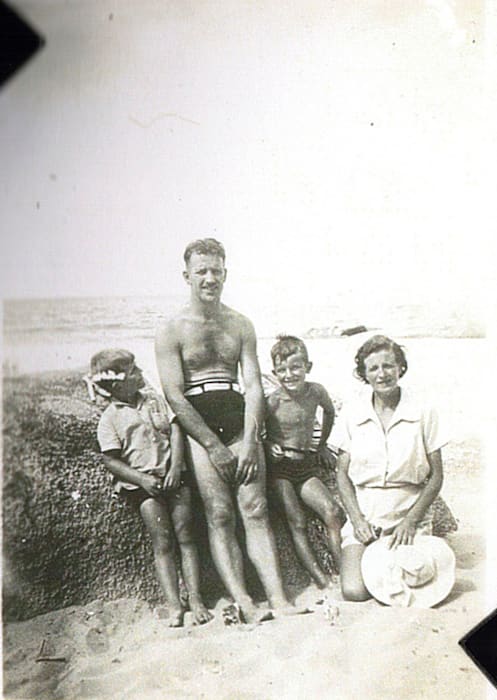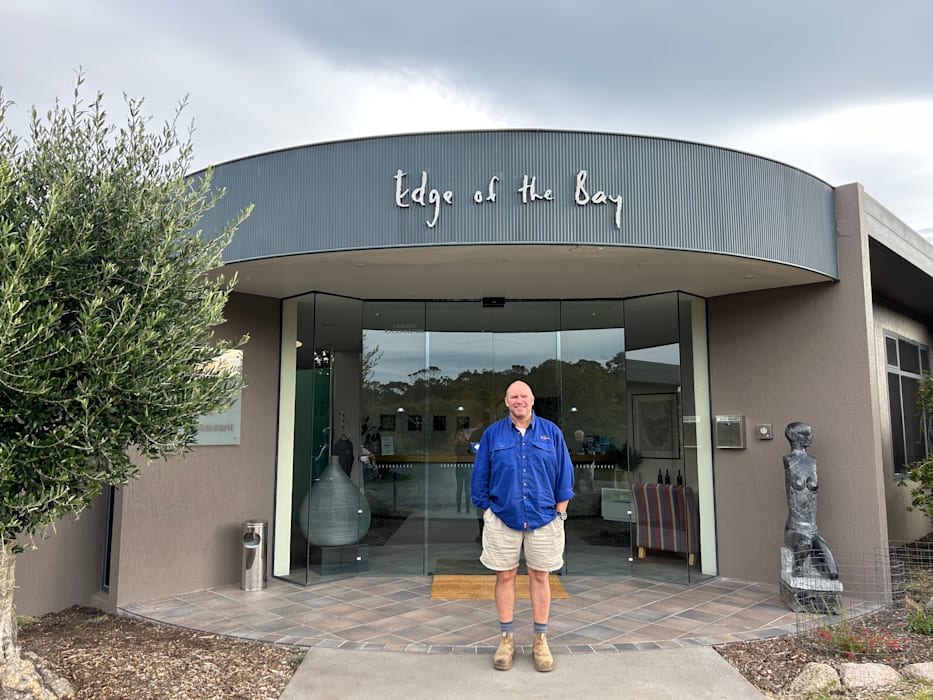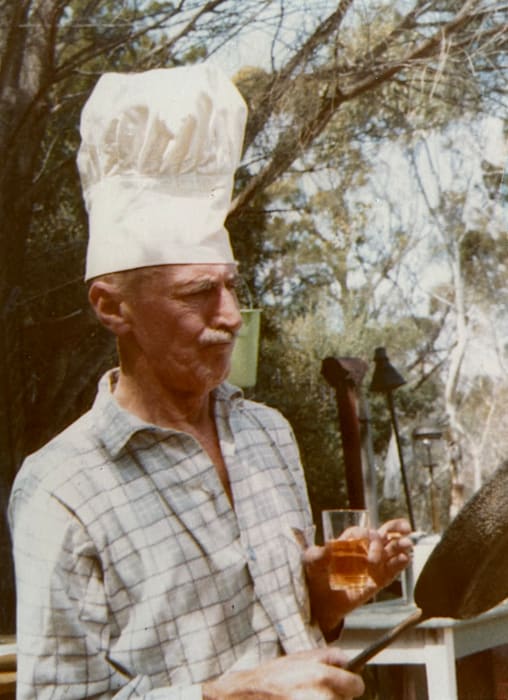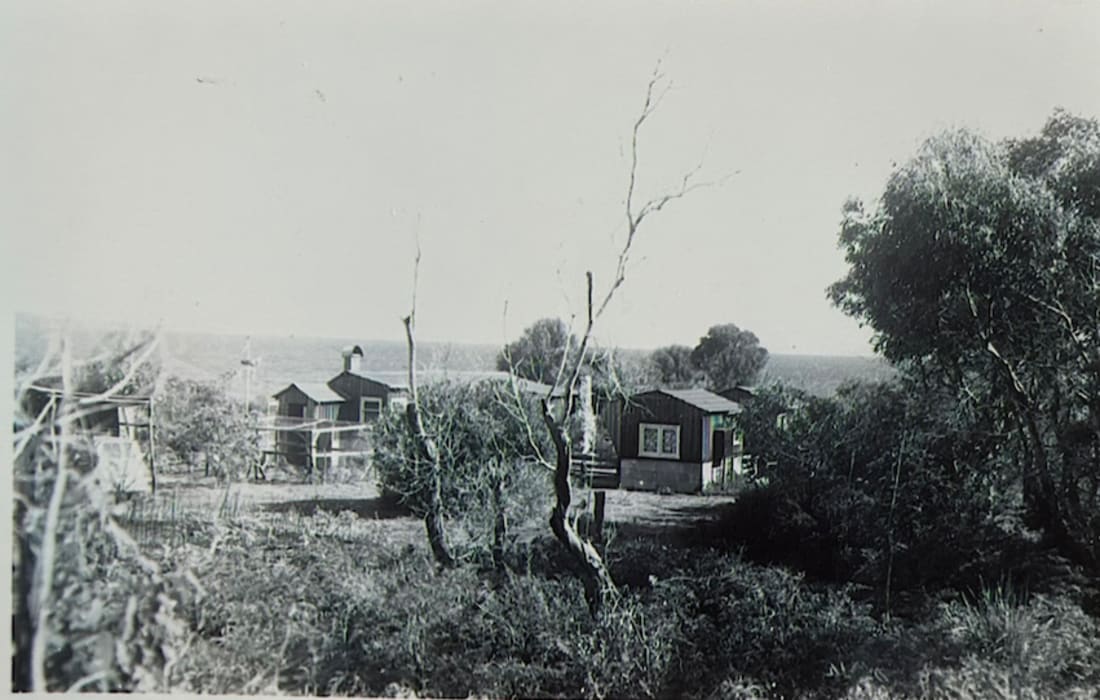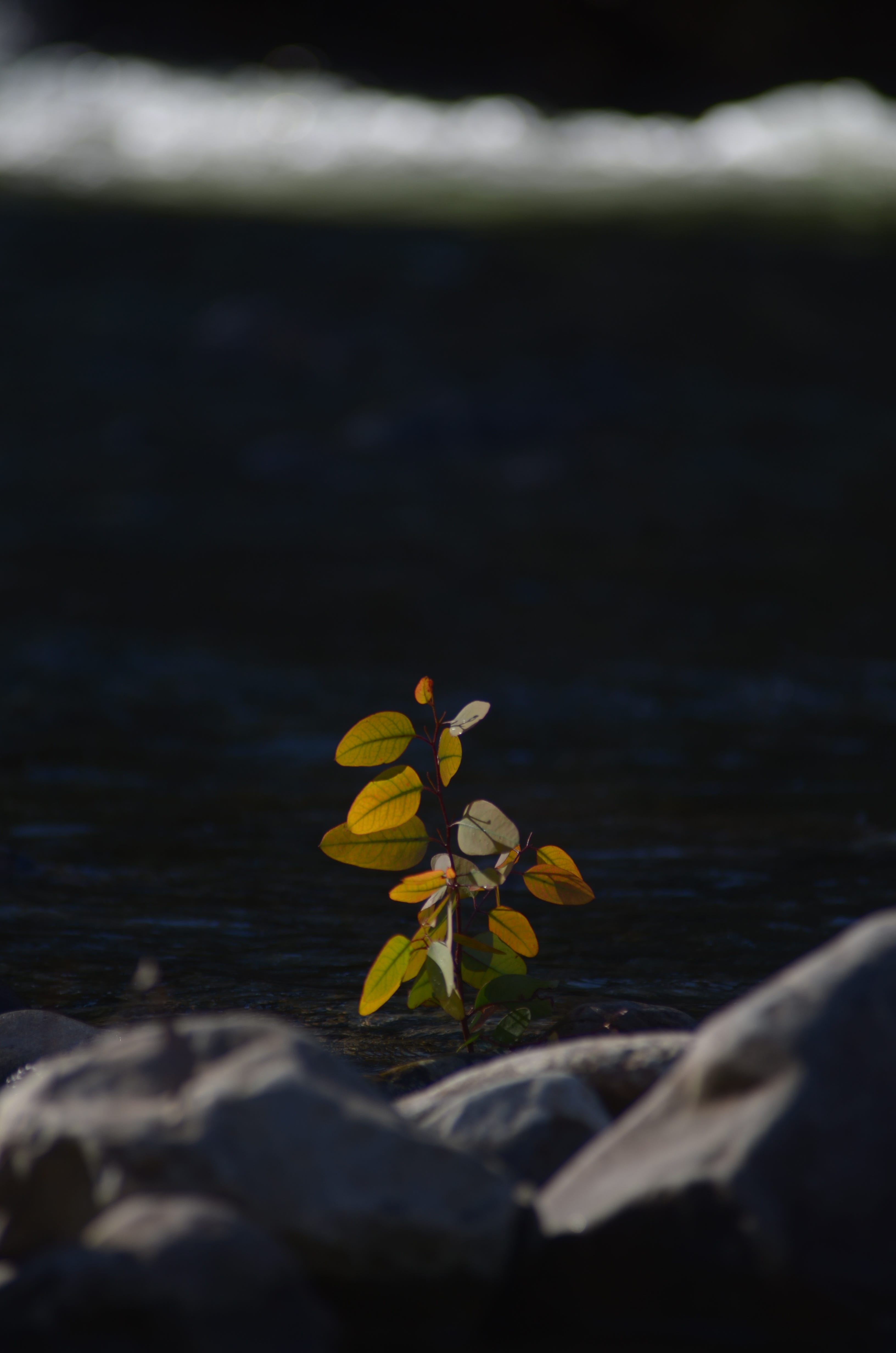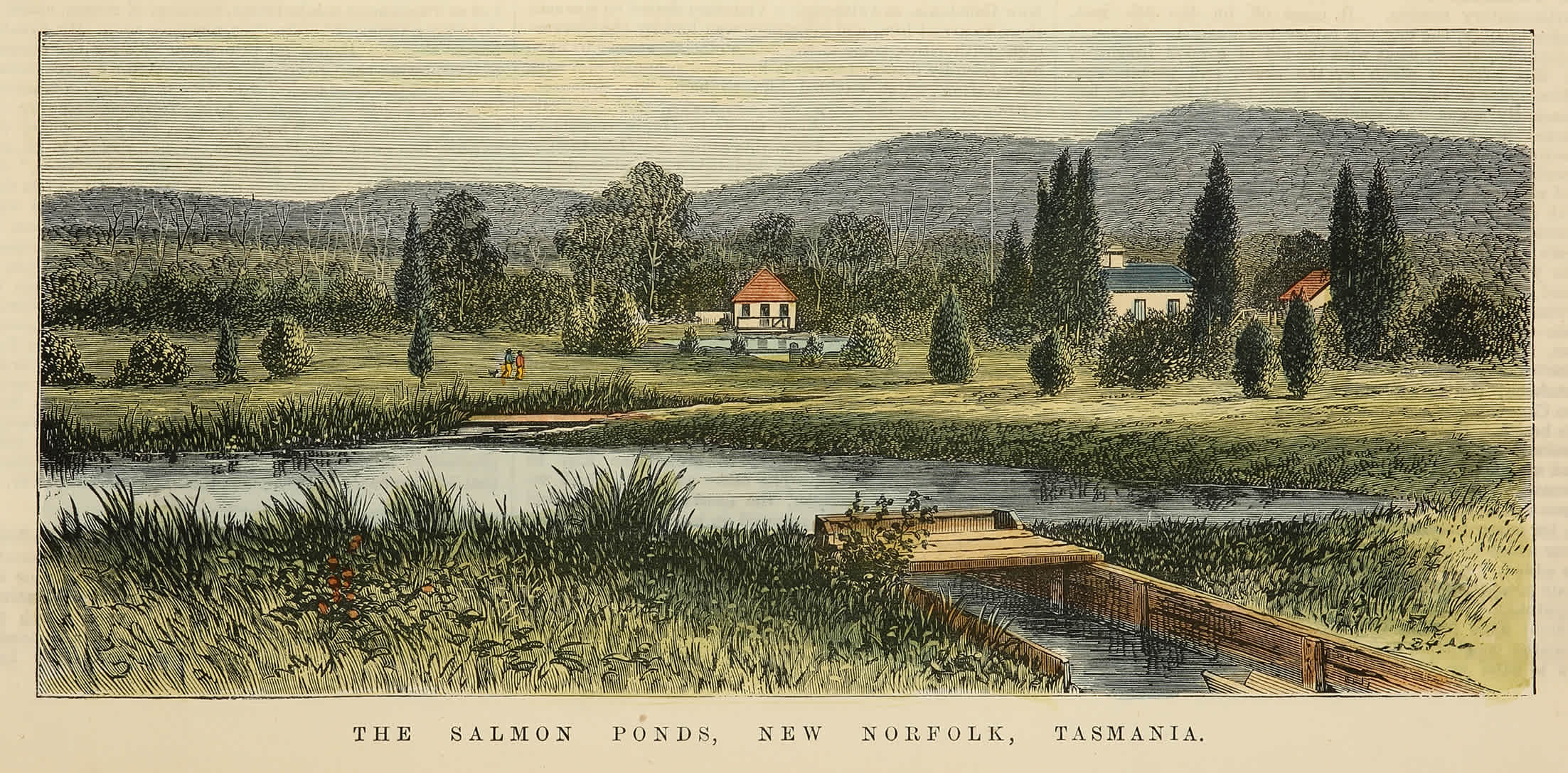photographs by Hilary Burden and from the Johnston family archive
Ray Johnston is 83. He has lived and holidayed on the Freycinet Peninsula since he was a boy, decades before the beach he grew up on was named one of the 10 best beaches in the world.
You could bury Ray’s story in a time capsule and bring it out in 50 years to say this is how things used to be done. It’s a very Tasmanian story, when families decamped to the beach, towed caravans on gravel roads, cleared land by hand and built their own shacks, had connections in council and government and used them, when headmasters were heavy drinking pals, and when you rowed out into the bay and caught three fish in a few seconds.
It was the era of self-sufficiency that preceded the current one of entitlement. That’s the story Ray tells, even while he struggles to remember it.
- You’ve got to account for my age. I forget most of the stuff.
- I bet you don’t.
- I bet I do. Sometimes I can’t remember yesterday.
At the time of writing, Jill and Ray Johnston are booked on a Bass Strait crossing, retiring to a unit on the Gold Coast after running Edge of the Bay Resort since January 1, 1980. Hats off to them. They’ve been married for 55 years, run a tourism business together 24/7, endured the death of their only daughter six years ago, handed the family business on to their son, and are now retiring together. Every year, they say, is a bonus.
You can tell letting go hasn’t been easy. Ray says his son Nick, Edge of the Bay’s general manager, is kicking him out. Nick says he’s got a “smothering pillow with a date on it” that’s a “gone by” day. Jill is like a well-oiled broker. She says she’s lived in an isolated area long enough; just wants to do more things and they’ve only got limited years left to do them.
- So, let’s get going!
Ray backs her up.
- The older you get, the colder you get. It’s a fact.
The 1940s family photo, in front of a granite boulder at The Fisheries near Coles Bay, is the first era. The age of innocence before mass tourism and short-term rentals and digital technology. Way before Wineglass Bay was named one of the world’s top 10 beaches by several travel authorities and written up in Lonely Planet, Freycinet was Ray’s childhood playground. He’s not one to big it up. Or big up anything really. He just says, “It’s a magic spot.” A little later, he adds that he’s never seen anything more picturesque in the world than the view from their holiday resort at Edge of the Bay.
Ray Johnston has been coming to Coles Bay since 1948, when he was eight years old. There’s a story about his father coming home from the war. Someone he’d been in the army with had a bit of a farm in Swanwick; another, Ron Richardson, ran the Chateau (now Freycinet Lodge) and owned land down to the high-water mark at The Fisheries (an eight-hectare parcel of private land within Freycinet National Park where George Meredith had established a whale “fishery” in the 1820s).
Looking for a place to holiday for his family of four, Ray Snr packed up the caravan and drove from Launceston to check out the spot his mate had recommended. Ray Jnr recalls the treacherous drive on gravel roads across Lake Leake and all the way down Coles Bay Road, ending in a final “terrible track” down to the gentle bay at the end. And that’s where they stayed, camped with the caravan right on the beach. And they did it again every holiday for the next four or five years. The place of dreams.
When The Fisheries was subdivided, Ray’s father bought the first title and built one of the first shacks (it’s still in the family, with one of Ray’s cousins). Every school holiday was spent here, as well as the long summer holiday. It must have been like a second schooling.
Naturally, once Ray met Jill and they started a family, he wanted the same for his own children, drawn by the east coast that had helped shape his character. This era in Ray’s life – a long story he says but one he remembers – involved a couple of good mates in Launceston (David McQuestin and Berkely Cox) getting together over a few Friday night beers and resolving to build a shack somewhere in Tasmania. Deciding on the east coast, they searched up and down to no avail, when Ray suggested they have a look at Coles Bay, which back then had a population of about 70.
“We got as far as where we are now, parked the car on the road and walked down the track, and there was an old shack called Hermit’s Haven. My mate stood in front of the shack, looked out over the bay and said, ‘What have we got to do to get this?’ And I said, ‘Well, I’ve got no idea’.”
There’s always someone who knows someone, however. Through Jill’s father, who worked for the Department of Main Roads, they found the Crown Land at Hepburn Point, 4km north of Coles Bay, had been leased by Alan Miller from Hobart, who first came to Coles Bay in 1945. Alan had a 14-year lease for 250 acres and visited regularly. He made it a permanent home when he retired in 1956, until he died in 1965. Alan’s ashes were buried on the point (the plaque still viewable inside the restaurant), and his haven left to the Francombes from the Huon, after transferring to a yearly license.
With the Francombes not using it, and after months of negotiation, the government agreed to sell the land to Ray and his mates “on a performance basis”.
“They said if you do something for the tourist industry, then you can buy it,” recalls Ray. And that’s how the holiday accommodation started. Based on the old Bicheno Holiday Village model, designs were completed in 1977 with building commencing in 1979. Ray recalls pouring concrete in the frost of an early winter, having to light fires to make smoke so the concrete wouldn’t frost.
Lessons were all learned on the property. Jill had been a teacher and Ray worked as a commercial flooring contractor. “We just made it up as we went along, just by what we felt was right,” says Ray. “We just loved the spot and wanted to take advantage of that.”
“We used to do a lot of carting ourselves,” says Jill. “We’ve always had station wagons that you could fit a fridge in or a stove – whatever you needed.”
The tourism minister of the day officially opened the $300,000 (part government funded) family accommodation complex of 10 self-contained, two-bedroom cabins on January 1, 1980. An additional private cottage was built which the Johnston family moved into permanently, with Nick and Natalie attending Bicheno Primary School.

As Ray and Jill pack up their Coles Bay lives for warmer climes, stories of other eras are shared. But there is an irony. While many of their Freycinet years were taken up with passionate promotion to increase visitation (both as members of the Coles Bay Progress Association and founding members of Tas Resorts), now the Johnstons want nothing more than fewer people to come to Coles Bay.
“How can 550 ratepayers raise enough through rates for 300,000 annual visitors?” asks Ray. “Everything gets back to more people – every problem we have gets back to more people. You’ve got to limit the numbers.”
Ray misses the old days when they played cards with the park rangers or met them as part of the local volunteer fire brigade or progress association. Now, he says, decisions are “overseen by Hobart”, and the rangers do their own thing, aside from any community participation or local input.
Nick has leased the restaurant (“Lure”, to chef Josh Strudwick), and is planning his own exit strategy which he says, “might take 20 years”.
Will Ray and Jill be coming home for Christmas? That’s too far ahead, they chime together. Time will tell.
Hilary Burden is a British/Australian author, journalist and photographer. She lives and writes from a shack on an acre in the low hills of Swansea. Her memoir, A Story of Seven Summers - Life in The Nuns’ House, was published in 2012 by Allen & Unwin. More of her photography can be seen on Instagram, @hilaryburden.


